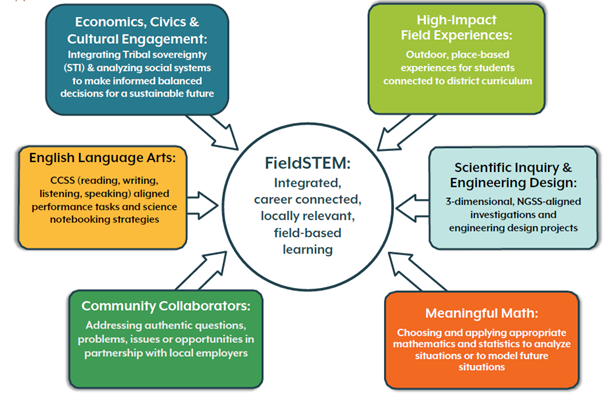PEI’s FieldSTEM model is designed to align across grade bands and integrate across subject areas, so having school leaders involved is critical. In February, 20 administrators and superintendents from around Washington attended one of two online Leadership Institutes and came away inspired by the possibilities ahead.
“PEI continues to lead the way in improved teaching and learning practices via an outdoor/ hands-on focus and set of practices,” said one participant. “It was very helpful to hear what – and more importantly, how – other districts are implementing FieldSTEM.”
At the workshops, participants got an overview of the FieldSTEM model, heard from both a teacher and a school district who are implementing FieldSTEM, explored examples of FieldSTEM implementation models and defined entry points to FieldSTEM for their districts.
They also heard from PEI board members and key partners. Elizabeth Schmitz is the Environmental and Sustainability Education Program Supervisor for the state Office of the Superintendent of Public Instruction (OSPI). She shared how PEI’s FieldSTEM model creates greater buy-in and longevity among educators and community partners, leading to systemic change. Schmitz also discussed the importance of developing pathways for students who aren’t served by conventional teaching methods.
“Environmental and sustainability education provides a pathway to engage students that may not engage well in traditional classroom contexts,” Schmitz observed. “This is particularly true for students with ADHD, autism and other social-emotional learning disorders. Environmental and Sustainability Education can provide students and educators with alternative pathways to meet learning goals.”
PEI Board Member Bill Monahan is the Director of Western Forest Resources at Rayonier. Through its partnership with PEI, the natural resources company has increased the number of worksite visits and learning opportunities for local high schools on the Olympic Peninsula. “The feedback we’re getting is that it’s really helpful for the students,” Monahan explained. “We hear that they had no idea there were so many types of jobs in forestry. When you think about career pathways, regardless of whether it’s forestry or a conservation district, it’s eye-opening for them to see that there are jobs in their area.”
Speaking of conservation districts, PEI Board President Ron Schultz is the Director of Policy and Inter-Governmental Relations at the Washington State Conservation Commission, which oversees 45 conservation districts statewide. He discussed PEI’s function as a public-private partnership, with board members who represent state agencies, private industry and Tribes. Schultz provided several examples of regional work conservation districts are doing with schools and districts and ended with a call to action. “I encourage everyone to engage with your local conservation district because they can help to get kids connected with farmers and engaged with outdoor learning experiences,” he said.
Ellen Ebert is OSPI’s Director of Secondary Education Content and Director of Science and has been an integral part of developing statewide Environmental and Sustainability learning standards. She shared the importance of approaches like FieldSTEM to student engagement. “Interdisciplinary work is an anchor and a catalyst for change,” she maintained. “It fosters students’ interest and their identities, and the same extends to the teachers and administrators who provide the leadership across the district. It strengthens our communities.”
PEI shared the video of Katie Standlea of Komachin Middle School, PEI’s teacher of the year in 2021, who speaks about her experience implementing PEI’s Urban Forestry Solutions Oriented Learning Storyline (SOLS) with her 8th-grade students. In attendance was Cascelia Miller, an elementary school teacher and FieldSTEM lead in Thorp School District, who shared the district’s project of transforming a large empty field into a thriving garden with a plant nursery, a pergola outdoor education classroom, a nature trail and a pollinator garden. The garden will grow food for the district’s cafeterias while also teaching students about agriculture and science through FFA and CTE courses.
Cascade School District 2020-2025 Strategic Framework includes “The Outdoors.”
Participants also heard from Cascade School District Superintendent Dr. Tracey Beckendorf-Edou, who shared that the district’s Strategic Framework includes “The Outdoors” as one of the core values: “We engage actively in the beauty and diversity of our natural environment to learn, stay fit, and how we impact the world around us.” Educators in her district are implementing FieldSTEM in multiple ways, from constructing a snow research lab to simply getting kids outside for a reading lesson.
